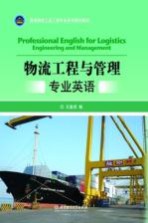图书介绍
物流工程与管理专业英语pdf电子书版本下载

- 王爱虎编 著
- 出版社: 北京:北京理工大学出版社
- ISBN:9787564079284
- 出版时间:2013
- 标注页数:292页
- 文件大小:149MB
- 文件页数:307页
- 主题词:物流-物资管理-英语-高等学校-教材
PDF下载
下载说明
物流工程与管理专业英语PDF格式电子书版下载
下载的文件为RAR压缩包。需要使用解压软件进行解压得到PDF格式图书。建议使用BT下载工具Free Download Manager进行下载,简称FDM(免费,没有广告,支持多平台)。本站资源全部打包为BT种子。所以需要使用专业的BT下载软件进行下载。如 BitComet qBittorrent uTorrent等BT下载工具。迅雷目前由于本站不是热门资源。不推荐使用!后期资源热门了。安装了迅雷也可以迅雷进行下载!
(文件页数 要大于 标注页数,上中下等多册电子书除外)
注意:本站所有压缩包均有解压码: 点击下载压缩包解压工具
图书目录
1.Evolution of Academic Concerns with Transportation and Logistics 1
1.1 The age of the economist 1
1.2 Broader concerns 6
1.3 The logistics evolution 8
1.4 Conclusions 10
2.Perspectives on the Evolution of Logistics Thought 14
2.1 Literature review 14
2.2 Research findings: six eras 18
2.3 How academic programs affect logistics thought 24
2.4 Conclusions 25
3.The Evolution and Future of Logistics and Supply Chain Management 27
3.1 The past 27
3.2 The present 32
3.3 The future 36
3.4 Reflection 37
4.Transport Reviews—The 30th Anniversary of the Journal 39
4.1 The early years: the 1980s 39
4.2 Consolidation: the 1990s 40
4.3 Maturity: the 2000s 41
4.4 Comments and reflections 43
4.5 Looking ahead 44
5.Supply Chain Network Design 48
5.1 Introduction 48
5.2 The network design problem 49
5.3 The supply chain and facility location 50
5.4 Developmental issues in facility location 51
5.5 Method comparison 58
5.6 Conclusions 58
6.Relationships Among TPL Providers and Members of Supply Chains 61
6.1 Introduction 61
6.2 Supply chain management strategies 62
6.3 Third-party logistics 63
6.4 General service 64
6.5 Service strategies for third-party logistics providers 66
6.6 Matching supply chain and third-party logistics strategies 69
6.7 Managerial implications 71
7.Security-aware Logistics 74
7.1 Introduction 74
7.2 Five Tenets of security-aware logistics and supply chain operation 75
7.3 Recent and potential regulations 82
7.4 A new type of smart container 85
7.5 Summary 86
8.Reverse Logistics 90
8.1 Introduction 90
8.2 Review of literature 91
8.3 The components of reverse-logistics systems 92
8.4 Conclusions 96
9.Green Logistics 98
9.1 Introduction 98
9.2 Research purpose 99
9.3 Research results 100
9.4 Conclusions and implications 104
10.Green Transportation for a Green Earth 108
10.1 Shipping 108
10.2 Trucking 111
10.3 Air transport 112
10.4 Pipeline 113
10.5 Railway/train system 113
10.6 Summary 115
11.Global Logistics 118
12.The Relationship Between Logistics and Supply Chain Management 126
12.1 History and definitions of logistics 126
12.2 History and definitions of supply chain 128
12.3 Logistics and supply chain definitions in practice 130
12.4 Discussion 132
12.5 Conclusions 133
13.Supply Chain Management 135
13.1 Introduction to supply chain concepts 135
13.2 Definition of supply chain 135
13.3 Interest in supply chains 136
13.4 History of the supply chain initiative 138
13.5 Collaborative supply chain initiatives 141
13.6 What the supply chain is not 141
13.7 Linking the supply chain to the business strategy 142
14.Information Systems Development Within Supply Chain Management 147
14.1 Introduction 147
14.2 Inteorganizational information systems 148
14.3 Internet IOS applications 151
14.4 Information sharing and communication improvements 153
14.5 Supplier relations 154
14.6 Customer service improvements 154
14.7 Conclusions 155
15.Simulation in the Supply Chain Context 158
15.1 Introduction 158
15.2 The role of simulation techniques in the supply chain context 159
15.3 Literature survey 163
15.4 Survey analysis 165
15.5 Conclusions 167
16.Supply Chain Costing: An Activity-based Perspective 171
16.1 Introduction 171
16.2 ABC 172
16.3 Integrating supply chain and ABC 173
16.4 Implementation issues of ABC 174
16.5 Managerial implications 178
16.6 Implementation techniques 179
16.7 Conclusions 179
17.Supply Management and E-procurement 182
17.1 Introduction 182
17.2 The purchasing process 183
17.3 E-procurement 184
17.4 The role of e-procurement in the purchasing process 184
17.5 E-procurement: a caveat 187
17.6 The benefits of e-procurement 187
17.7 Making a business case for e-procurement 189
17.8 Economic value added (EVA) 189
17.9 Enter e-procurement 190
17.10 Limitations of EVA 192
17.11 Summary 192
18.RFID Technologies 195
18.1 Introduction to RFID technology 195
18.2 The MIT AUTO-1D Center and EPCglobal 197
18.3 Process freedom and supply chain visibility 202
18.4 Managerial guidelines for RFID development 202
18.5 Conclusions 209
19.Centralizing Logistics Leads to Mixed Results 212
19.1 Delivery quality 212
19.2 Inventory management 213
19.3 Logistics costs 214
19.4 Structure strategically 215
20.Logistics Certifications 217
20.1 The chartered institute of logistics and transport in the UK 217
20.2 AST&L’s certification in transportation and logistics 219
20.3 Professional logistician (P.Log.) designation in Canada 225
20.4 Institute of logistics management’s certified logistics practitioner in America 232
21.Reading for Fun 234
21.1 Fifty years of excellence 234
21.2 CLM changes to CSCMP 240
21.3 A logistics nightmare 240
21.4 Challenges in the air cargo supply chain 243
21.5 Benchmarking in logistics 247
21.6 Synchronizing the supply chain 249
21.7 World logistics competitiveness ranking (2012) 251
21.8 RFID in the supply chain 252
专业词汇汇总表 257
参考文献 291